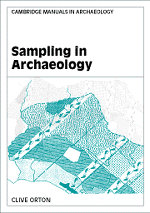Book contents
- Frontmatter
- Contents
- List of illustrations
- List of tables
- Acknowledgements
- 1 All the world's a sample
- 2 A little of what you fancy?
- 3 If this is the sample, what was the population?
- 4 Covering the ground
- 5 What's in a site?
- 6 The answer lies in the soil
- 7 ‘But many sanguine people hope, to see them through a microscope’
- 8 ‘In its depths, what treasures’
- 9 Beyond random sampling
- Appendix
- Bibliography
- Index
4 - Covering the ground
Published online by Cambridge University Press: 05 June 2012
- Frontmatter
- Contents
- List of illustrations
- List of tables
- Acknowledgements
- 1 All the world's a sample
- 2 A little of what you fancy?
- 3 If this is the sample, what was the population?
- 4 Covering the ground
- 5 What's in a site?
- 6 The answer lies in the soil
- 7 ‘But many sanguine people hope, to see them through a microscope’
- 8 ‘In its depths, what treasures’
- 9 Beyond random sampling
- Appendix
- Bibliography
- Index
Summary
Introduction
The regional archaeological survey is an instrument whose nature and status have changed throughout this century, and particularly since about 1970. Four main reasons have been put forward for undertaking such surveys:
(a) discovery of sites, or prospection,
(b) estimation (e.g. of site densities or numbers),
(c) characterisation or specification (Wobst 1983, 37) (of the archaeological distribution within a region), and
(d) hypothesis testing (Wobst 1983, 40).
The emphases both between and within these aims have shifted over the years, following changes in academic and legal climates.
As a preliminary, we need to establish what is meant by both a region and a site. Although the term region may have a definite administrative meaning in some countries (or even several conflicting ones, as in the UK), it is used very broadly in archaeology to denote a spatially defined unit of territory, ranging from a few sq km in the British ‘Parish Survey’ (e.g. Aston and Gerrard 1995, 5) to 10,000 sq km or more (Read 1986, 479). The smaller examples can be thought of as ‘samples of size 1’ within larger regions, while the regions per se should exhibit some sort of topographical or cultural coherence (for example, an island (e.g. Cherry 1982, 13), a drainage basin (e.g. Read 1986, 477; Barker 1995), or a distinct topographical zone such as the English Fens (Hall 1987) or the Agro Pontino in Italy (Voorrips et al. 1991)).
- Type
- Chapter
- Information
- Sampling in Archaeology , pp. 67 - 111Publisher: Cambridge University PressPrint publication year: 2000

